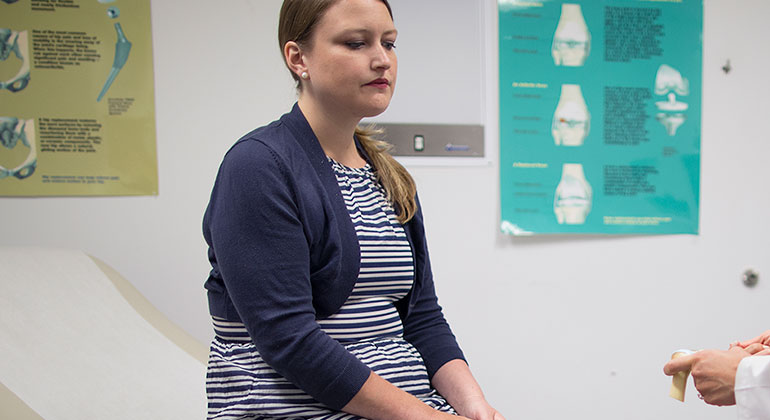Knee Pain

Knee pain can stem from a medical condition, injury, or poor posture. You may be able to treat minor knee pain with rest, ice, compression, and elevation. But if this form of treatment isn’t helping after a week, you should see a doctor. At Mount Sinai, we are highly skilled in the diagnosis and treatment of all sorts of knee conditions.
Conditions We Treat
You might experience knee pain due to a medical condition or injury. The most common causes of knee pain are:
- Arthritis: With over 100 varieties, the most likely forms of arthritis to affect the knee are osteoarthritis and rheumatoid arthritis. Osteoarthritis is a degenerative condition; rheumatoid arthritis is an autoimmune disease. Severe arthritis can be difficult to treat and often requires the surgical replacement of your joint. Our anti-inflammatory approach can allow you to delay or even prevent the need for an operation
- Iliotibial band syndrome: This condition affects the tough band of tissue that runs down the side of your leg from hip to knee. When this band becomes so tight that it rubs against the outer portion of your femur, you may feel knee pain. Distance runners are most susceptible to this condition. Whether you want to train for that marathon or just walk up a flight of stairs pain-free, we can help
- Injured ligaments: Athletes are most likely to have injured ligaments tend to affect athletes. You can injure your anterior cruciate ligament (ACL), your medial collateral ligament (MCL), or your posterior cruciate ligament (PCL). Our team approach can ensure that you’re back on your feet in no time
- Knee bursitis: You may experience knee bursitis due to injury or by overstraining sensitive areas of the knee. We most often treat knee bursitis with rest and anti-inflammatory medications. This condition may be debilitating with a long recovery time. For tough cases or for the hard-working person who needs to remain active, we can successfully treat this condition quickly with the removal of inflammation-causing knee fluid and give you targeted anti-inflammatory injections
- Patellar tendonitis: When there is irritation and inflammation of one or more of your tendons connected to the patella (kneecap), you may have patellar tendonitis. Tendons are the thick tissue that connect muscle to bone. Jumping can cause patellar tendonitis, so we often see the condition in runners, skiers, and cyclists. We can provide effective treatment to keep you active so you can continue to enjoy your favorite physical activities
- Patellofemoral pain syndrome: If you feel consistent pain between your kneecap and thighbone, you may have patellofemoral pain syndrome. It stems from injury in the young and arthritis in older adults. Muscle strengthening and physical therapy can be very effective for this condition and our targeted programs can help you recover quickly
- Weak gluteal muscles: These stem from poor posture and a lot of sitting. They can cause a variety of symptoms including pain in your, leg, back, hip, or pelvis
Diagnosis
When you come to us with knee pain, we begin the diagnosis process with a physical exam. We check for swelling, pain, tenderness, and bruising. We assess for weak muscles, and see how well you can move. If necessary, we might perform imaging tests such as X-rays, computed tomography (CT) scans, ultrasounds, and magnetic resonance imaging (MRI).
Treatments We Offer
The treatment we provide depends on your diagnosis. We use a variety of treatment approaches for knee pain relief, including:
- Acupuncture can be helpful. It involves inserting a very thin needle into your skin at specific pressure points. This procedure is often the perfect tool for targeting many different kinds of pain because it is effective with minimal pain
- Medications can relieve pain and allow you to effectively participate in rehabilitating your condition without suffering
- Physical therapy helps strengthen the muscles around your knees and ankles to improve stability. We will also show you how to correct your technique during sports and everyday activities, to avoid hurting yourself again. We help you strengthen your gluteal muscles, which can make a major difference. Knee pain exercises work best for conditions caused by injury
- Targeted Anti-Inflammatory Injections provide medication directly to the joint. We might use corticosteroids for pain relief, hyaluronic acid to improve mobility, or platelet-rich plasma to reduce inflammation and help you heal. These can provide weeks to months of relief for your condition so that you can quickly get back onto your feet



